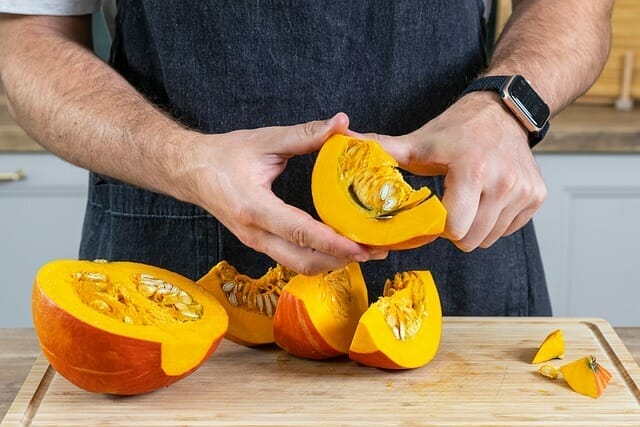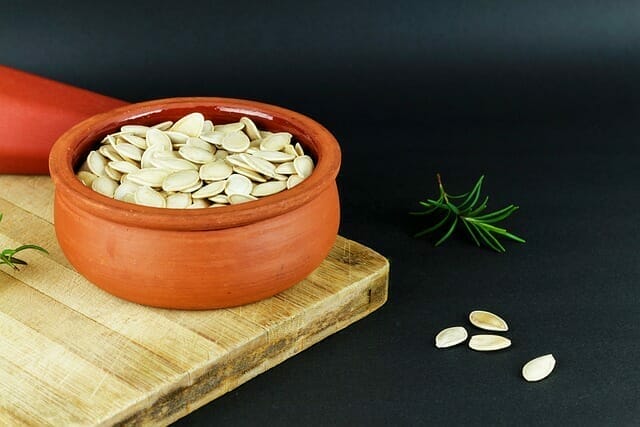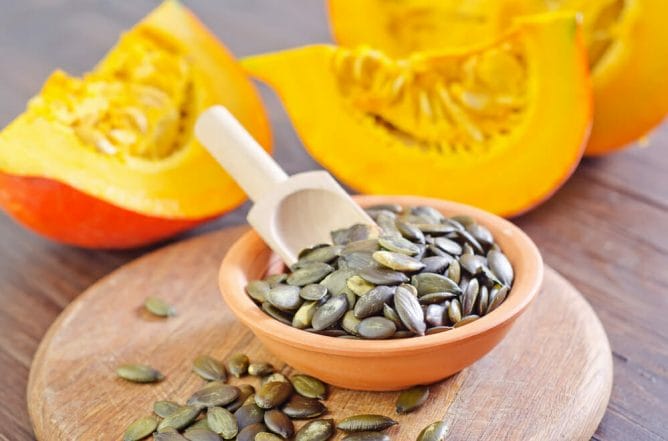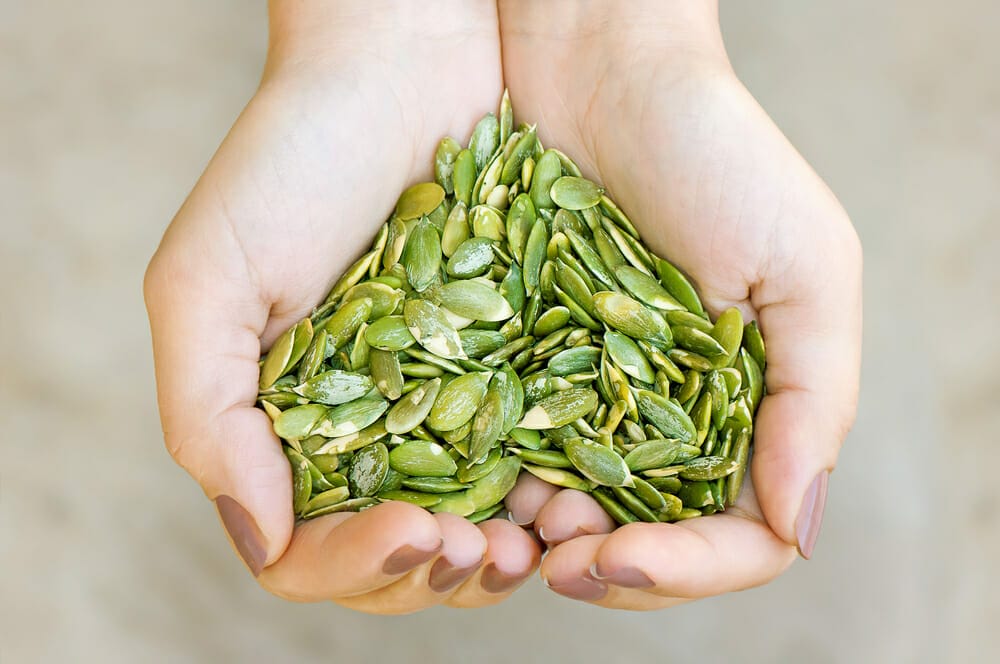Due to their high content of zinc, antioxidants and many other components, pumpkin seeds have great health-promoting potential that is worth taking advantage of. They have a beneficial effect on the cardiovascular and immune systems, and help combat urinary ailments. Pumpkin seeds are also a valuable aid to male problems. Consumed regularly, they take care of health and well-being, and what’s more, they improve the condition of skin, hair and nails. Find out how to use pumpkin seeds to actively support the whole body.
Table of contents
- 1 Pumpkin seeds – an ingredient for healthy cooking and a plant-based prescription for many ailments
- 2 Nutritional values of pumpkin seeds
- 3 Pumpkin seeds – health properties
- 4 Pumpkin seeds for the urinary tract
- 5 Pumpkin seeds – properties for men (for prostate and good sexual performance)
- 6 Pumpkin seeds for cardiovascular health
- 7 Pumpkin seeds as protection against diseases of civilization
- 8 Pumpkin seeds for worms
- 9 Pumpkin seeds and diabetes
- 10 Pumpkin seeds to improve the functioning of the nervous system
- 11 What other health properties do pumpkin seeds have?
- 12 How to use pumpkin seeds for health purposes?
- 13 Roasted pumpkin seeds and raw pumpkin seeds – uses in the kitchen.
- 14 How to store pumpkin seeds?
Pumpkin seeds – an ingredient for healthy cooking and a plant-based prescription for many ailments
Pumpkin seeds are a healthy snack available both in shell and shelled form, which can also be obtained with your own hands directly from the pumpkin. All you need to do is cut the pumpkin, extract the seeds, dry them, and then store them in a dry place.
Since pumpkin seeds are among the most nutritionally valuable grains, it is worth using their potential in the fight for better health and well-being.

Pumpkin is a vegetable for which both the flesh and the seeds, or pips, exhibit many health-promoting properties. Pumpkin flesh, which accounts for about 75% of the total weight of pumpkin fruit, is rich in antioxidants of the carotenoid group, including beta-carotene, alpha-carotene and lutein, which are valuable for health. The more orange pumpkin flesh, the more carotenoids contained.
Pumpkin seeds are rich in antioxidants, and you can also find unsaturated fatty acids and sterols valuable for the heart, as well as other beneficial substances. In addition, pumpkin seeds are pressed into oil, which is among the top most healthy vegetable oils. Pumpkin seed oil has very beneficial effects on both health and skin condition.
Nutritional values of pumpkin seeds
Pumpkin is not a very often used vegetable in the menu, meanwhile its nutritional value is very high. If we are not fond of pumpkin, which is specific in taste and somewhat bland, we do not have to exclude it from our meals right away. We can cook it in the company of other, slightly more pronounced vegetables and sauces that will conquer its flavor.
Whether we are convinced of the taste of pumpkin flesh or not, and whether we use it in cooking or not, it is definitely worth introducing pumpkin seeds to the menu. They are a treasure trove of nutrients, plus they are very tasty and go well with many dishes.
Pumpkin seeds contain a wide range of valuable ingredients for health, including vitamins and minerals, with zinc leading the way. In a handful of fresh pumpkin seeds you will find as much as 2.5 mg of zinc. Pumpkin seeds are also a good source of the vitamin of youth, vitamin E. Also noteworthy are the beta-sitosterols present in pumpkin seeds, which alleviate the problem of incontinence and take care of prostate health.
The most important components of pumpkin seeds:
- vitamins (vitamin A, vitamin E, thiamin, niacin, folic acid, riboflavin, vitamin B6, vitamin K, vitamin C),
- unsaturated fatty acids (monounsaturated fatty acids, polyunsaturated fatty acids),
- minerals (zinc, selenium, magnesium, potassium, phosphorus, calcium, copper),
- phytosterols,
- cucurbitacin,
- polyphenols,
- lecithin,
- lignans,
- protein,
- dietary fiber.
The energy value of pumpkin seeds is 560 kcal in 100 g. One handful of this product provides about 100 kcal, one tablespoon – 60 kcal.
Although pumpkin seeds are quite caloric, we can include them in our diet even when we are in the process of losing weight. Why? Because they are usually eaten in small quantities (after 2-3 handfuls there is a feeling of satiety and the appetite passes). In addition, pumpkin seeds contain a lot of dietary fiber that promotes slimness and have a very low glycemic index. So they do not carry the risk of weight spikes.
Pumpkin seeds – health properties

Eating pumpkin seeds every day or several times a week is a great way to replenish many vitamin and mineral deficiencies. First of all, pumpkin seeds cover zinc deficits, and therefore support sexual function, stimulate the detoxification process of the body and activate the immune system to work better.
Eating pumpkin seeds is also a method of providing the body with a whole range of vitamins and elements needed for skin health, including vitamin A, vitamin E and B vitamins. Why else should you reach for pumpkin seeds?
Pumpkin seeds for the urinary tract
Including pumpkin seeds in your menu permanently is one of the most effective home remedies for urinary tract ailments. This includes urinary tract infections, as well as other health problems that result in incontinence, frequent urination or difficulty emptying the bladder.
Why are pumpkin seeds among the top natural urinary tract health boosters? The answer is their rich composition, in which you can find at least 8 components that act to protect, strengthen and regulate the urinary system. These include zinc, selenium, cucurbitacins, manganese, beta-sitosterols, phytoestrogens, vitamin C, adenosine.
How pumpkin seeds support the urinary tract:
- reduce inflammation in the urinary tract,
- fight bacteria responsible for urinary tract infections,
- strengthen muscles in the bladder and pelvic floor muscles, counteracting the problem of incontinence,
- improve the functioning of the urethra,
- reduce the pressure on the bladder, counteract overactive bladder,
- strengthen blood vessels in the urinary tract,
- have a diuretic effect, increase the power of the urine stream, making urination easier,
- regulate the frequency of urination,
- prevent urine retention in the bladder, help it to empty completely.
Highly concentrated pumpkin seed extract enriched with other urinary tract support ingredients can be found in UrinoFix.
Pumpkin seeds – properties for men (for prostate and good sexual performance)
Pumpkin seeds, mainly due to their content of zinc, selenium, omega acids and sterols, take care of the proper work of the reproductive organs, as well as protect the cells of the prostate gland, preventing prostatic hypertrophy.
Thanks to the beta-sitosterols they contain, pumpkin seeds contribute to reducing the volume of the prostate, lead to a decrease in prostaglandins in prostate tissue and regulate inflammatory processes in prostate cells. They also take care of maintaining proper bladder function.
Pumpkin seeds should be permanently included in the diet of men who want to take care of prostate health, as well asas well as men who want to increase libido, improve sexual performance and improve fertility. The zinc contained in pumpkin seeds has a positive effect on the quality and quantity of sperm produced, as well as the number and motility of sperm. Also, zinc regulates the secretion of hormones, including testosterone, taking care to maintain sex drive and potency at the right level.
Check out a multi-ingredient formula to support prostate health: Prostoxalen.
Pumpkin seeds for cardiovascular health
Thanks to unsaturated fatty acids and phytosterols, pumpkin seeds help lower blood cholesterol levels, which means theythat they are a very good preventive measure against cardiovascular diseases such as atherosclerosis, coronary heart disease, heart attacks and strokes. These ingredients also have a positive effect on the functioning of the heart muscle. Cardiovascular health is also served by the vitamin K and potassium contained in pumpkin seeds.
Pumpkin seeds as protection against diseases of civilization
The zinc, vitamin A, vitamin C and vitamin E contained in pumpkin seeds, as well as phytochemicals such as carotenoids, phytosterols and lingans, make pumpkin seeds stand out for their strong antioxidant activity. By participating in the removal of excess free radicals from the body, they counteract oxidative stress on cells and, as a result, protect them from damage.
The antioxidant properties of pumpkin seeds translate into slowing down the aging process and increasing protection against diseases of civilization, such as cancer, diabetes, macular degeneration, as well as neurodegenerative diseases such as Alzheimera disease.
Pumpkin seeds for worms
Pumpkin seeds contain cucurbitacin, which is a potent weapon against worms residing in the human body. It works by damaging the nervous system of parasites and facilitating their expulsion from the body. Cucurbitacin, contained in pumpkin seeds, is particularly helpful against parasites of the digestive tract, such as tapeworm, duodenal hookworm, human roundworm, and pinworms.
To get rid of worms, 2-3 tablespoons of crushed pumpkin seeds combined with 2 tablespoons of honey or fruit juice are used on an empty stomach. After 30 minutes, to induce a laxative effect, drink a teaspoon or tablespoon of castor oil. The parasites are removed with the feces.
Pumpkin seeds and diabetes
Pumpkin seeds have a very low glycemic index, which means that their consumption does not cause spikes in blood glucose levels. What’s more, pumpkin seeds not only do not raise blood sugar levels, but actually help normalize them. Therefore, their presence in the diet is recommended for people facing diabetic problems.
Pumpkin seeds to improve the functioning of the nervous system
Since pumpkin seeds are a source of magnesium, zinc, selenium, lecithin, potassium and omega acids, they have a very positive effect on the nervous system. They normalize mood, counteract mental fatigue, and help maintain good mental performance.
What other health properties do pumpkin seeds have?
- They improve and speed up the process of removing heavy metals and toxins from the body,
- have a strengthening effect on bones and teeth,
- stimulate hair and nail growth,
- show beneficial effects on the skin – they regenerate and revitalize it,
- positively influence fertility in women and support the normal development of the fetus (thanks to the content of folic acid),
- accelerate the healing process of wounds.
How to use pumpkin seeds for health purposes?

The valuable properties of pumpkin seeds will be fully felt by using this product frequently and in the right amounts. The optimal portion is 30 g of pump kin seeds per day (about 3 tablespoons).
We can consume a daily serving of pumpkin seeds (30 g) at once or in 2-3 doses. We can snack on the seeds unadulterated, make smoothies with them from a blender or, after grinding, mix them with honey, yogurt or juice and consume them as a mush.
Roasted pumpkin seeds and raw pumpkin seeds – uses in the kitchen.
Pumpkin seeds are a snack well known to lovers of healthy cuisine, with an interesting flavor and many culinary possibilities. They can be eaten raw or roasted in a dry pan. They can be snacked on their own, accompanied by other seeds (such as sunflower seeds) and nuts, or added to desserts, blender smoothies and meals.
Pumpkin seeds will work well as an addition to salads, stuffings, pastes, pesto type sauces, yogurts, oatmeal, cheese and cottage cheese, as well as baked goods (cakes, cookies, muffins). They can also be sprinkled on toast and sandwiches and added to some hot dishes, including soups (especially cream soups), pasta dishes and rice dishes.
How to store pumpkin seeds?
Pumpkin seeds should be stored in a dry and cool place. If you intend to keep them at home for a long time, it is best to store them in the refrigerator.
Sources:
- https://www.healthline.com/health/mens-health/pumpkin-seeds-and-prostate
- https://www.healthline.com/nutrition/11-benefits-of-pumpkin-seeds
- https://www.webmd.com/diet/ss/slideshow-health-benefits-pumpkin
- https://www.ncbi.nlm.nih.gov/pmc/articles/PMC9182978/

